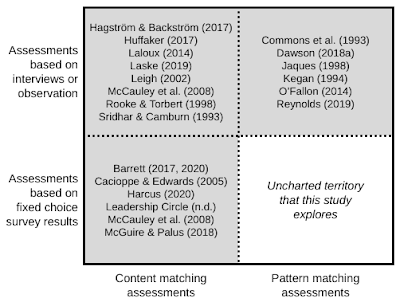Assessing the Vertical Development of Organizations (Full Dissertation)
Abstract: Organizational development (OD) is increasingly being applied well beyond organizations to solve more complex, global-scale problems. But it is at a disadvantage, since mainstream OD has rejected a type of complexity these challenges contain called vertical complexity. Vertically complex problems, especially intractable ones, tend to remain unsolved by scaling existing solutions. They require new, transformative approaches that depart qualitatively from what has worked elsewhere. The adult development (AD) field specializes in helping people solve more vertically complex problems, but not how to solve them together to tackle challenges at scale. The field of vertical OD integrates AD and OD sensibilities to address complex, global-scale problems, but it is hamstrung by a major measurement problem. Despite 50 years of theorizing, there is still no suitable method to assess the vertical development of a team, organization, or collective of any size. This dissertation was an attempt to make one. It contains a comprehensive review of all known vertical OD assessments in use, a new typology to organize them, a new definition of vertical OD, a new model, and a new survey-based assessment engineered to prevent respondents’ own developmental stage from distorting their assessment of a group they inhabit. However, a large-scale validation study (n = 2,536) unexpectedly and forcefully demonstrated this distortion effect in a way that suggests the models of vertical OD may be confounding the measurement of vertical OD. Several guidelines for future experimentation are offered.
Read the full dissertation (330 pages) in Google Docs or PDF
- Just want the high level overview? Check out the slides or summary video.
- Note that the last chapter (chapter 5, ~40 pages) summarizes all prior chapters and offers a good starting point for most people interested in this work. It interprets my empirical findings into what they mean for consultants / practitioners as well as for researchers. It also contains many internal references to earlier chapters, making it easy to dive deeper on any topics of interest.
- Got questions or want to connect? Reach out anytime.
